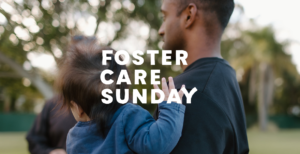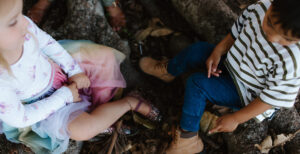Yāṯôm part one: What the Bible really says about the orphan
I grew up with a deep love for the outdoors. From a young age, my dad would take my brother and me camping and backpacking.
One year we were gearing up for a 50-mile backpacking trip with several of my friends and their parents in Lassen National forest through the beautiful Cascade Mountains of California. In preparation for the trip, everyone had to read about how and what to pack. Preparation was very important because primitive trails like these have no running water, bathrooms, or trash cans. You had to pack in and pack out everything you needed for the four-day journey. Mount Lassen was a particularly difficult hike because the trails were covered in sand which made walking even more tiring. Carefully reading about how and what to pack was essential for completing the journey alive and healthy.
For the most part we had all prepared well and were equipped for the hike. That is, all of us except my friend Jason. Because Jason had lots of experience camping, he only skimmed the material that told him what to pack – but packing for camping and packing for a hike are completely different.
Only a half-day into our wilderness journey, we noticed that Jason kept falling behind, so we stopped to see how he was doing. Jason told us that he felt exhausted and that his back was really hurting. We were all surprised by this, because Jason was in great shape! We decided to divide some of the items in his pack to help lighten his load, but when we opened his backpack, we couldn’t believe what we found.
Jason had packed multiple non-essential items that were making his pack exceedingly heavy, including several cans of food, a large bottle of hair spray and – wait for it – a blow dryer! After we recovered from the shock of how poorly Jason had packed, we ate all the canned food, distributed some of Jason’s items among the other hikers and went on our way.
I believe there are many ‘Jason’s’ among those seeking to advocate for children in foster care. There are many people who set out on the journey of foster care having read only part of the manual. Like Jason, they have made assumptions about what the Bible says about the fatherless and these assumptions have left well-intentioned travelers exhausted or unable to complete the journey.
Advocating for children in foster care – like hiking the Cascade Mountains – is a beautiful yet challenging journey, and one that we must be diligent to prepare for.
Pastor Rick Warren helps us unpack why seeing the Bible as a manual for life is so important.
“Life can be dangerous, so it’s essential that you use the right equipment. One of those pieces of equipment is the Bible. It’s like God’s owner’s manual for your life. Like any good owner’s manual, the Bible gives you instructions and you can consult it when you need help.”(1)
The path of life can be dangerous and the Bible helps us find our way. It is a life manual, full of wisdom. It contains the teachings necessary to prepare us for the journey of foster care.
The problem is that when people refer to the ‘manual’ about God’s heart for the fatherless, they often only point to one or two verses in the Bible. Be honest – how many times have you heard or read content about foster care or adoption that references either James’ call for “true religion” or the Psalmist reminder that “God sets the lonely in families?” Both passages are certainly important for helping us know how and what to pack for the journey of foster care, but is that really all the Bible has to say about the fatherless? Are these two passages really enough to understand God’s heart for vulnerable children? And most importantly, are they adequately preparing us for what’s ahead? Because unless we truly understand what to pack, we will not have the necessary supplies to finish the journey – let alone finish in a place of health.
Part of the problem is that most people have neglected the Old Testament – the place where the vast majority of references to the fatherless are found. In fact, James 1:27 is the only place in the New Testament that orphans are explicitly mentioned. When we compare this one reference to the 42 mentions of the orphan in the Old Testament it becomes clear that the vast majority of the Bible’s teaching comes from the Hebrew Scriptures.
42 times in the Old Testament God reveals his heart towards children who do not have a home. 42 times God provides the insight and perspective we need to care for these amazing children. If we have any hope of truly understanding God’s heart for vulnerable children we can no longer neglect the truth these passages have to offer.
I mean, can you imagine trying to do a 42 piece puzzle with only one or two pieces!? How frustrating!? How incomplete!? Yet I am proposing this is exactly what we do when we neglect the majority of God’s thoughts about vulnerable children. It’s time we stopped being content with one or two pieces of the puzzle. It’s time we go looking for the rest of the pieces so we can see the beautiful picture of God’s heart for the fatherless.
So for the next few weeks we will open the manual and start gathering the missing pieces of the puzzle in hopes that we better prepare ourselves for the journey. But before we start, it would be helpful to understand a bit about the trail ahead.
The Old Testament was originally written in Hebrew. Anytime you study the Old Testament, you should do a bit of research to discover what key Hebrew words are used and what insight those words offer regarding your topic. Most English translations use the words ‘fatherless’ and ‘orphan’ to describe children who need a home. But when we look at the Hebrew we learn that both English words are translated from the single Hebrew word yātôm [ya-TOME]. As I have mentioned already, yātôm is a common word occurring 42 times in the Old Testament. What is interesting – and very insightful – about the word yātôm is that it is constructed around the Hebrew verb meaning ‘to be lonely.’ One would expect the word to mean something like ‘to be without parents.’ Yet in the Hebrew mind, to be an orphan, is to be lonely.
I believe this small insight offers profound wisdom to help us navigate the needs of adoptive children and kids in foster care. There is a cold isolation and loneliness that many children in foster care experience. Even once children find an adoptive home the experience and trauma of being removed from your birth family never completely goes away.
I was talking with a mum just the other day who was sharing how her teenage adopted daughter told her how isolating it was to be the only adoptee among her peers. This experience left her feeling like she was the only one who didn’t belong in the group. Another adoptive mum shared how after her four-year-old daughter’s birth mum’s parental rights were terminated she sat in her lap crying out “mummy, mummy!” Even though this precious little girl was actively being held by her forever mum, somewhere deep down inside, she felt alone.
I don’t cite such examples to be fatilist or hopeless. As one of the most quoted passages about yātôm says, we serve a God who is “a father to the fatherless.” A “God [who] sets the lonely in families.” (Psalm 68:5-6). I mentioned these stories to highlight the brilliance of Hebrew wisdom. The very word yātôm gives us deep insight and direction on how we can best love children without a family – to be present with them in their loneliness. Once we correctly understand the word, yātôm becomes a safeguard against thinking there is an easy answer to meeting the needs of adoptive children and kids in foster care. It teaches us that yātôm’s very experience has been marked by loneliness and what they need most is for us to be with them. God calls his people to be the embodied presence of Christ – a presence that stands with yātôm through their best and worst days.
We will be diving into the Old Testament scriptures to learn what the Bible actually says about yātôm, unpacking aspects of God’s heart for the fatherless. My hope and prayer is that by the end of our time together we will all be a little more equipped for the journey. And by God’s grace, more of us will not only make it to the end of the trail, but when we arrive at our destination, we will be healthy.
This blog is part one of a series:
Yatom part two: I couldn’t believe what I found
By Ryan MacDonald
Ryan MacDonald is from Foster The City who are equipping churches to provide loving homes for children in foster care in California and beyond. This blog was originally published 3.02.2022 on the Foster The City blog which you can find here fosterthecity.org/blog.
References:
1 – https://pastorrick.com/the-bible-gods-owners-manual-for-life/








